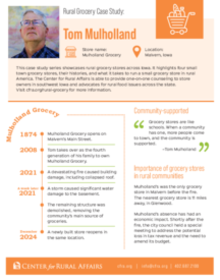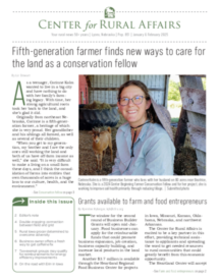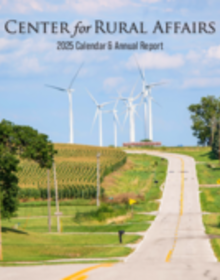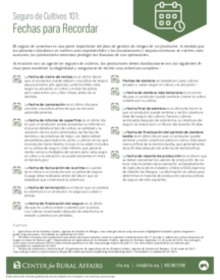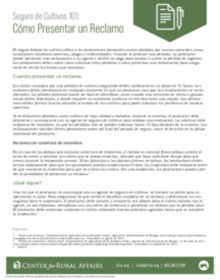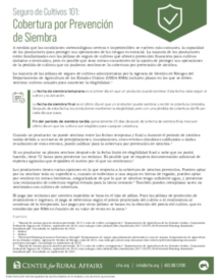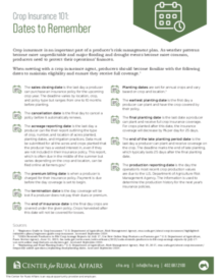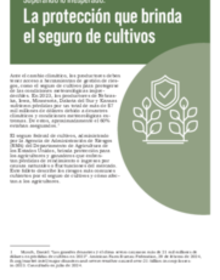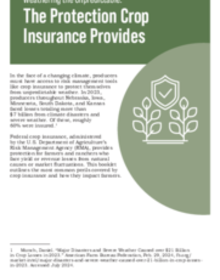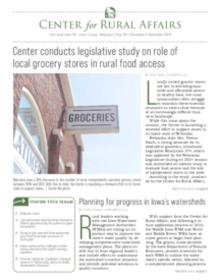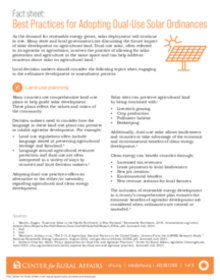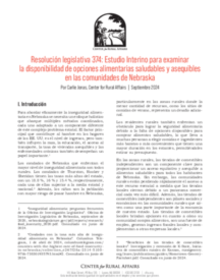We aren't afraid of the weeds. The people living in rural America deserve a serious and in-depth look at the issues and forces impacting their communities.
For the English version, click here. La expansión de la ley de alimentos caseros en Nebraska en 2024 es un paso importante para empoderar a los emprendedores locales y fomentar el crecimiento económico en las comunidades rurales. La ley permite a las personas producir y vender ciertos alimentos de...
- Small Towns
- Farm and Food
- Policy
The 2024 expansion of cottage food law in Nebraska is a significant step toward empowering local entrepreneurs and fostering economic growth in rural communities. The law allows individuals to produce and sell certain low-risk foods from their homes without the need for a commercial kitchen, which not only provides opportunities for small-scale food producers but also supports the local economy by keeping money in the community. Nebraska’s improved cottage food law contributes to a more vibrant and diverse food landscape in the state.
- Small Towns
- Farm and Food
- Policy
Renewable energy projects offer significant opportunities for rural communities, including the stimulation of economic growth and job creation. In recent years there have been efforts to unlock new opportunities for counties to gain additional financial and non-financial benefits beyond tax revenues and land lease payments. Some rural communities have used Community Benefit Agreements with clean energy developers to outline how proposed projects can help rural areas thrive.
- Small Towns
- Policy
A growing demand for sustainable energy generation combined with decreasing equipment costs has created more opportunities for the development of wind and solar energy projects. Wind and solar projects are often located in rural areas and can provide numerous benefits to nearby communities...
- Small Towns
- Policy
This case study series showcases rural grocery stores across Iowa. It highlights four small-town grocery stores, their histories, and what it takes to run a small grocery store in rural America. The Center for Rural Affairs is able to provide one-on-one counseling to store owners in southwest Iowa and advocates for rural food issues across the state.
- Small Towns
- Farm and Food
Editor’s note As we enter the new year, I can’t help but reflect on the past 366 days and ponder what’s next. In 2024, I had the privilege of traveling to six new-to-me states—all east of the Mississippi River. While driving windy mountain roads, two-lane highways, and through small towns, I noticed...
- Lending
- Small Towns
- Farm and Food
- Policy
This 2025 calendar illustrates month-by-month the accomplishments you helped us achieve in 2024.
- Lending
- Small Towns
- Farm and Food
- Policy
El seguro de cosechas es una parte importante del plan de gestión de riesgos de un productor. A medida que los patrones climáticos se vuelven más impredecibles y las inundaciones y sequías extremas se vuelven más comunes, los productores necesitan proteger las finanzas de sus operaciones.
- Farm and Food
- Policy
El seguro federal de cultivos ofrece a los productores protección contra pérdidas por causas naturales, como condiciones climáticas adversas, plagas y enfermedades. Cuando se produce una pérdida, un productor puede presentar una reclamación a su agente y recibir un pago para ayudar a cubrir la pérdida de ingresos. Los productores deben saber cómo informar estas pérdidas y cómo presentar una reclamación para asegurarse de recibir los fondos que necesitan.
- Farm and Food
- Policy
A medida que las condiciones meteorológicas severas e impredecibles se vuelven más comunes, la capacidad de los productores para proteger sus operaciones de los riesgos es esencial. La mayoría de los productores están familiarizados con las pólizas de seguro de cultivos que ofrecen protección financiera para cultivos dañados o destruidos, pero es posible que sean menos conscientes de la opción de proteger sus operaciones de la pérdida de cultivos que no pudieron sembrarse: la cobertura por prevención de siembra.
- Farm and Food
- Policy
Crop insurance is an important part of a producer’s risk management plan. As weather patterns become more unpredictable and major flooding and drought events become more common, producers need to protect their operations’ finances.
- Farm and Food
- Policy
Federal crop insurance offers producers protection against losses from natural causes, such as severe weather, pests, and disease. When a loss occurs, a producer can file a claim with their agent and receive a payment to help cover the lost income. Producers should know how to report these losses and how to make a claim to ensure they receive the funds they need.
- Farm and Food
- Policy
As severe and unpredictable weather becomes more common, producers’ ability to protect their operations from risk is essential. Most producers are familiar with crop insurance policies that offer financial protection for damaged or destroyed crops, but they may be less aware of the option to protect their operations from the loss of crops that could not be planted: prevented plant coverage.
- Farm and Food
- Policy
Ante el cambio climático, los productores deben tener acceso a herramientas de gestión de riesgos, como el seguro de cultivos para protegerse de las condiciones meteorológicas impredecibles. En 2023, los productores de Nebraska, Iowa, Minnesota, Dakota del Sur y Kansas sufrieron pérdidas por un total de más de $7 mil millones de dólares debido a desastres climáticos y condiciones meteorológicas extremas. De estos, aproximadamente el 60% estaban asegurados.
- Farm and Food
- Policy
In the face of a changing climate, producers must have access to risk management tools like crop insurance to protect themselves from unpredictable weather. In 2023, producers throughout Nebraska, Iowa, Minnesota, South Dakota, and Kansas faced losses totaling more than $7 billion from climate disasters and severe weather. Of these, roughly 60% were insured. Federal crop insurance, administered by the U.S. Department of Agriculture’s Risk Management Agency (RMA), provides protection for farmers and ranchers who face yield or revenue losses from natural causes or market fluctuations. This booklet outlines the most common perils covered by crop insurance and how they impact farmers.
- Farm and Food
- Policy
Consulte la última edición de Small Business News, repleta de recursos para emprendedores, quienes buscan ser dueños de su propio negocio y gerentes de pequeñas empresas.
- Lending
- Small Towns
Check out the latest edition of our Small Business News packed full of resources for entrepreneurs, those looking to own their own business, and small business managers.
- Lending
- Small Towns
In this edition of our Center Newsletter you will find stories about a legislative study on role of local grocery stores in rural food access, planning for progress in Iowa’s watersheds, the story of Sabino and Maria Hernandez who established their food truck business in Schuyler, Nebraska and found success, among other stories.
- Lending
- Small Towns
- Farm and Food
- Policy
As the demand for renewable energy grows, solar deployment will continue to rise. Many state and local governments are discussing the future impact of solar development on agricultural land. Dual-use solar, often referred to as agrisolar or agrivoltaics, involves the practice of allowing for solar generation and agriculture in the same space and can help address concerns about solar on agricultural land. Local decision makers should consider the following topics when engaging in the ordinance development or amendment process.
- Small Towns
- Policy
Para abordar eficazmente la inseguridad alimentaria en Nebraska se necesita un enfoque holístico que abarque múltiples métodos coordinados, cada uno adaptado a un componente diferente de este complejo problema estatal. El factor principal que contribuye al hambre en los hogares de los EE. UU. es el nivel de ingresos, pero también influyen la raza, la educación, el acceso al transporte, la tasa de viviendas asequibles y las enfermedades crónicas también desempeñan un papel importante.
- Small Towns
- Policy






